As shocking as this episode is, will America become inured to it?
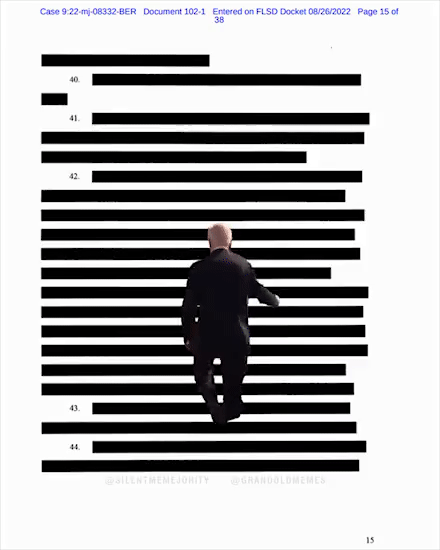
30 August 2022 – It is sometimes difficult (and sometimes pointless) to follow the political and social machinations going on back in the land of my birth without a spirit of disgust. But even though I am a verified cynic and no longer a U.S. citizen, I find myself irrevocably tangled in America’s hopes, arrogance, and despair. Anti-American? No. Just anti-the-politics. Because once someone is branded anti-American, the chances are that he or she will be judged before they are heard, and the argument will be lost in the welter of bruised national pride.
No, I am not anti-American. I’m not anti-jazz, nor opposed to freedom of speech, and delight in Bruce Springsteen, Taylor Swift, Ernest Hemingway and Henry Miller. And I have no quarrel with the giant sequoias. And how can you not admire the hundreds of thousands of American citizens who marched against the murder of George Floyd, or for civil rights, or against voter suppression. I have but one American friend living here in Europe and we rarely see each other. But when we do we chat about family, wine and food. Not politics. Well, European politics but not American politics.
And a lot of what I am about to say has to do with geography and how it explains the United States. In 2013 I wrote a short piece for a French newspaper about how geography explains the U.S. and I said in part:
Sigmund Freud argued that in the human enterprise, anatomy is destiny. In the affairs of nations, geography – what it wills, demands, and bestows – is destiny too. It can’t explain everything, to be sure. Britain and Japan are both island nations. That might explain their reliance on naval power and even their imperial aspirations. But what accounts for their fundamentally different histories? Other factors are clearly at play, including culture, religion, and what nature bestows or denies in resources. Fortune, along with the random circumstances it brings, pushes them in different directions.
Still, if I had to identify that one thing that – more than any other – helps explain the way Americans see the world, it would be America’s physical location. It’s kind of like in the real estate business: It’s all about location, location, location.
The United States is the only great power in the history of the world that has had the luxury of having nonpredatory neighbors to its north and south, and fish to its east and west. The two oceans to either side of the country are what U.S. historian Thomas Bailey brilliantly described as “its liquid assets”.
You can read my whole piece in English by clicking here.
Because America’s geographical position is so unique in the world, it has led to its worldview being unrealistic and riddled with contradictions. It is why Americans (as a whole), no matter how well-intentioned they may be, cannot grasp what is happening in Europe, in Russia, in Ukraine, in the *real world* of global politics. It does not have the requisite geographical history.
And when it comes to Donald Trump, so many seem shocked and cannot accept he has been engaged in all manner of morally reprehensible skulduggery all his life (and obviously he is not the only one to do so in the U.S.) which has been common across the world for … well, forever. Reality? America was never that “city upon the hill”. We need to kill that myth.
Last week the Department of Justice released the affidavit it used to obtain permission to search Mar-a-Lago and seize files from Donald Trump. The document fills in some details but leaves many questions unanswered, largely because it is heavily redacted — as it should be. The sanctity of the investigation demands it. So does the security of the U.S. What we knew before has been further confirmed — Trump absconded with hundreds of classified documents.
My favorite bit: the government said it gleaned the information it included in the affidavit from “a significant number of civilian witnesses.” This detail will undoubtedly fuel Trump’s paranoia, but it also suggests just how unsafe these national secrets were at Mar-a-Lago.
We now know these were incredibly sensitive and included information on clandestine human sources and secrets not to be shared with foreign governments. We may never know the documents’ exact contents — that’s how sensitive this material is.
Over the weekend I was on a few long phone chats and Zoom chats with members of my military intelligence and cybersecurity community. Just a few thoughts on the affidavit.
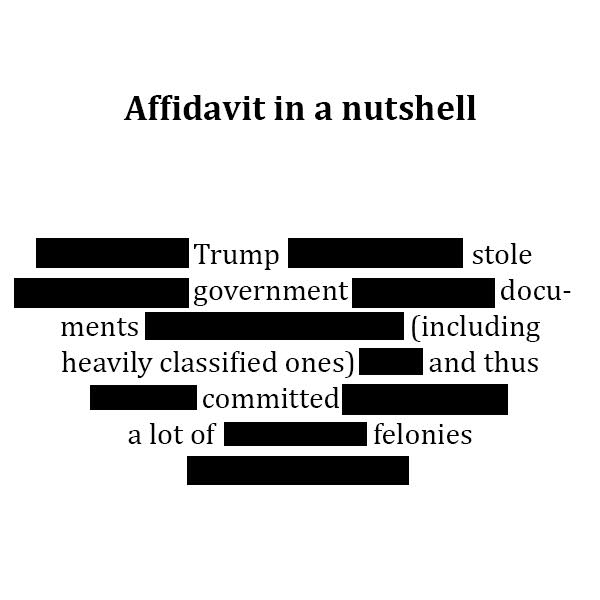
What is so striking, as many others have observed, is that as president, Trump was notoriously uninterested in details. He doesn’t read. He certainly doesn’t pore over policy details. He is famous (or infamous, depending on who is assessing) for “not getting into the weeds.” So why these documents? Why did he care so much? What, if anything, do they have in common? Can they point to a motive? We can speculate on what that might be, understanding that he has long ago lost any benefit of the doubt.
As we learn more, as we look for clues, as we wonder and question, we should be careful not to lose track of the big picture. At the very minimum, this situation represents a major breach of national security. My military intel friends say they are convinced Trump has already sold secrets: hence the Saudi $2 billion investment in his son-in-law’s real estate firm, the death of dozens of CIA informants around the world, etc., etc. They detailed a number of other events but I will save that for a later post.
And it gets worse. As The Washington Post detailed over the weekend, boxes of classified documents even came with Trump on foreign travel, following him to hotel rooms around the world — including countries considered foreign adversaries of the United States. Carried by this guy:
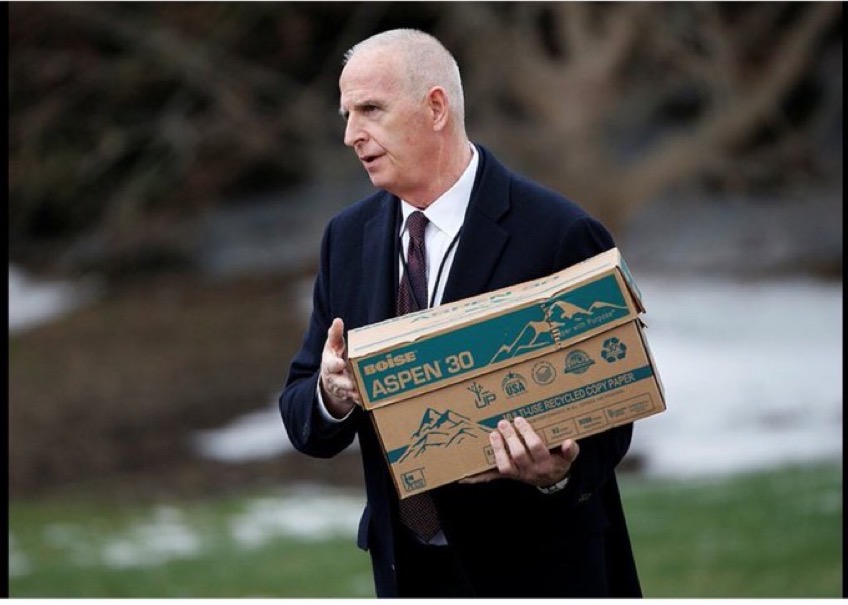
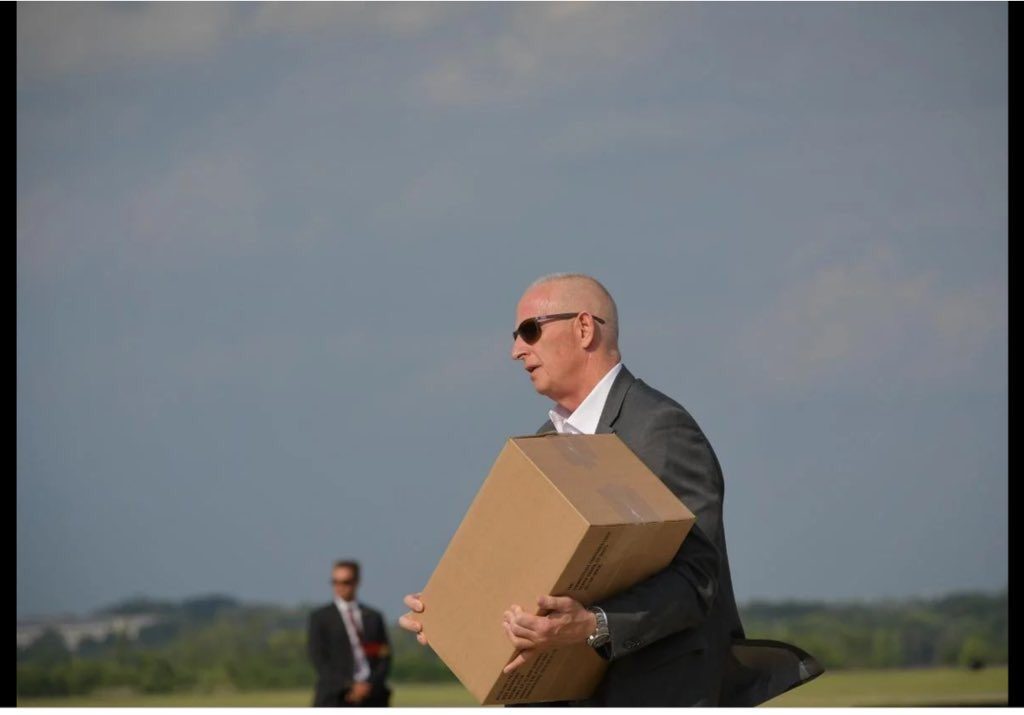
Who is that guy? That’s Keith Schiller, a former cop, who served as Deputy Assistant to Donald Trump and was Director of Oval Office Operations when Trump was President. Prior to his appointment in the Trump administration, Schiller served as the Director of Security for The Trump Organization. In this capacity, he was the personal bodyguard to Trump. He has been described as “one of Trump’s most loyal and trusted aides” and a constant presence at Trump’s side for nearly two decades. Though retired, the Republican Party continues to pay him $15,000 a month.
NOTE TO READERS: the reason I am holding back on a lot of the material my intel community gave me is that there is a side issue, which is that China and Iran both cracked the CIA’s classified communications system, known as “covcom”, and they were aided by Americans who provided information to the adversarial agencies that exposed informants. This is outside the Trump classified documents issue. Oh, it’s a slippery slope and it needs a careful narrative.
But as to Trump, do we really believe that any other citizen of this country, which is who post-presidency Trump is, would be walking free if found in possession of these documents? The media has detailed scores of people prosecuted and jailed for having just one secret document. But rather than being persecuted, as Trump self-servingly claims, this affidavit makes it clear that the Department of Justice was extraordinarily patient — possibly to a fault. They gave Trump every opportunity to hand these over. And yet he didn’t.
So let’s briefly talk about classified documents.
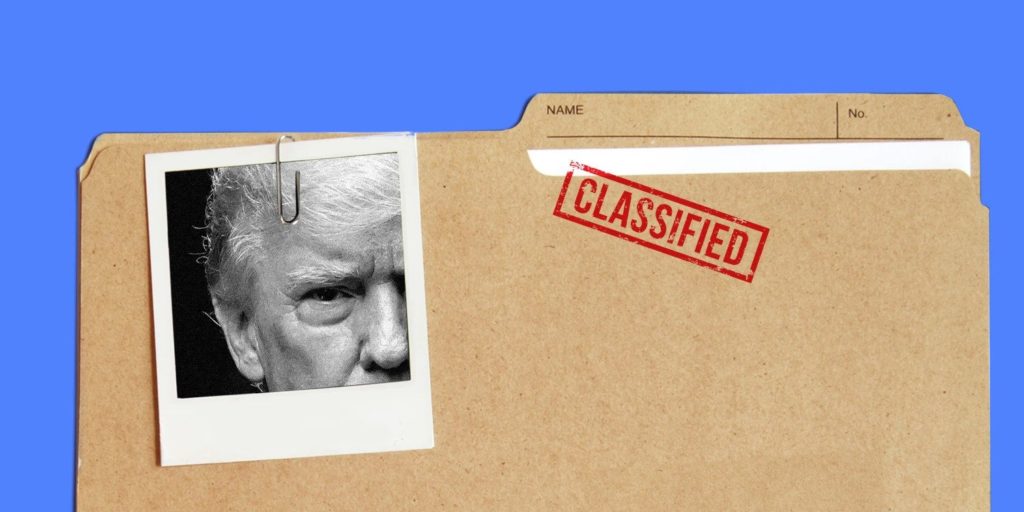
Most people have never seen one and have no idea what might be in such material. Republicans know this, and they are counting on the public’s lack of familiarity when they try to downplay the intelligence nightmare Trump created by carting off boxes of classified documents to Mar-a-Lago. Even worse are the GOP challenges to release these materials to the public so we can all decide for ourselves if the stuff is dangerous, a patently stupid and irresponsible position advanced by people who know better.
Breakdowns of the various levels of information classification are available online (good sources here and here), but they’re not that helpful out of context. The unauthorized disclosure of “Secret” materials, according to the law, could cause “serious damage” to national security, while the release of “Top Secret” information could result in “exceptionally grave damage.” These broad categories of risk include many possibilities, from mere “disruption” of U.S. foreign relations to “disclosure of technical and scientific developments,” to far worse possibilities of “armed hostilities.”
As Tom Nichols, a staff write for The Atlantic, noted last night on his blog:
Some documents, such as war plans or technical specifications about weapons systems, have obvious intelligence value. Most classified materials, however, just aren’t all that sexy at first glance. They’re not likely to look anything like the “Non-Official Cover” list of spies from Mission Impossible; they’re not nuclear codes; they’re not pictures of foreign leaders in flagrante. That type of information exists, of course, but such materials typically have a short shelf life. (Codes and plans, for example, change regularly.) This is why spy agencies, including ours, try to develop assets who can deliver a stream of information over time.
Nonetheless, there are plenty of things you can lug in a box that would be deeply dangerous to U.S. national security.
Technical and scientific documents, for instance, are almost always highly valuable. Enemy engineers can figure out a lot from technical secrets, including how to close gaps with the United States in weapons development, which in turn can create direct threats to U.S. military forces.
My intel community told me there are also other, less obvious threats to security than “here’s where our tanks are parked and here’s how accurate our missiles are.” This is why you often hear the phrase sources and methods when discussing classified information: One of the greatest risks is that an adversary will learn how we’ve discovered their secrets. If a classified document provides the missing pieces that would help a foreign intelligence organization backtrack and reconstruct how we know what we know, we could lose the sources—technological and human—that provided the material, which is a much deeper long-term problem. On occasion, revealing such sources can result in embarrassment or a minor scandal, perhaps involving a diplomat or some other friendly source in a foreign nation. Sometimes the consequences are much worse.
Small things matter. The location of an air base or missile installation might not be a secret. But if a state gains our photographs of its bases, it will know many things: when we’re observing, what we’re looking at, and so on, and it can counteract our ability to keep watching.
One military intel analyst expanded on this:
Even seemingly trivial details can put someone’s life in danger. Presidents and other senior U.S. officials, for example, are routinely given classified briefings on foreign leaders. Some aspects of a foreign leader’s life might be knowable only from sources close to that leader, and perhaps only from his or her own family. “Leader X speaks excellent English but pretends he does not know any English at all” is a good thing to know, but depending on how we know it, that detail might be classified; if Leader X finds out that we know it, he will immediately run through a list of people who are privy to that knowledge, which is how spies and informants end up in prison or even dead.
Many materials at lower levels of classification, too, can be meaningful to a trained eye. I spent the first part of my career working entirely from open, unclassified sources on the Soviet Union. Like many Sovietologists of my day, I sometimes conferred with analysts from the CIA and the Pentagon, trying to piece together events inside the Kremlin. We were able to learn a lot, despite the Soviet regime’s tight control over a system that tried to guard almost everything about itself.
And finally, as I was told, it’s important to understand that, in many cases, what’s classified is not a particular set of facts but what the intelligence community thinks those facts mean. An adversary might not know what a president is thinking on a given subject, but if they can see the President’s Daily Brief or other classified reports, they can know what he’s been told by his nation’s analysts. That’s extremely valuable in itself.
What Trump did was reckless and stupid. Any assertion that a few boxes of notes and papers isn’t a big deal is nonsense. Protecting such materials is a patriotic duty of anyone in public service, but the Republicans, once a self-styled party of national security, have decided that defending Donald Trump and his narcissistic demands is more important than the safety of the United States. All of his sycophants like Lindsey Graham and Rand Paul (both of whom made secret trips to Russia on Trump’s behalf) are simple enablers. I can only imagine what Kompromat Trump and Putin have on those guys. But there were 100s of people at the White House who surely knew what was going on – all enablers.
And as all things in America these days, this saga has become “partisan” – rather than a reflection on the seriousness of these documents. Or, rather, it is a reflection of how unserious the Party of Trump is when it comes to our national wellbeing.
As shocking as this episode is, I hope America does not become inured to it – as it seems to do with everything else it experiences. A shock like this should not wear off. Will justice be served? Will Trump be held accountable?
Biden is giving a special primetime address from Independence Hall in Philly this Thursday on “the continued battle for the Soul of the Nation”. Most think it’s to frame the midterm election season. But *before* Labor Day? Is he laying the groundwork for Trump to be indicted? Or will it be to appeal for calm right after? Stay tuned.